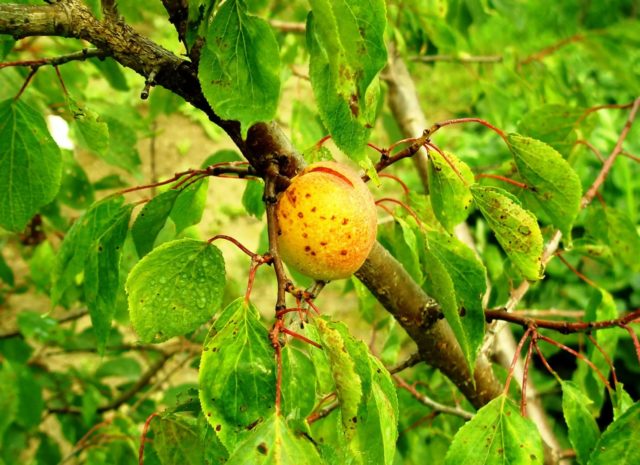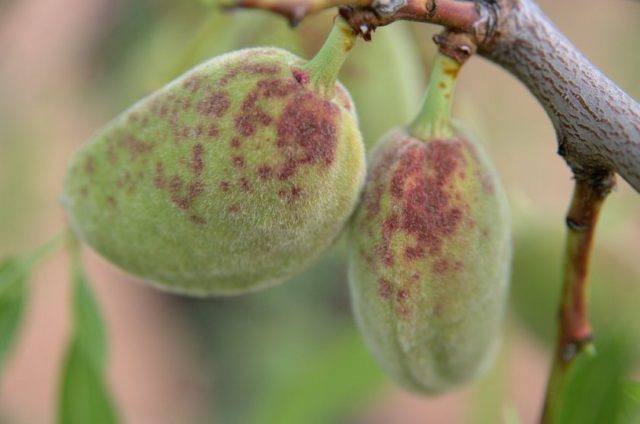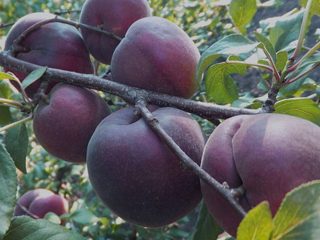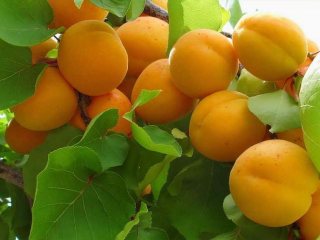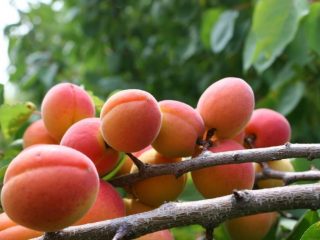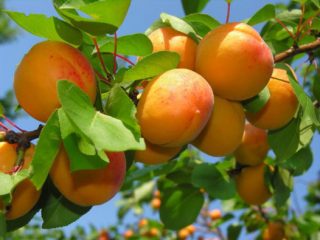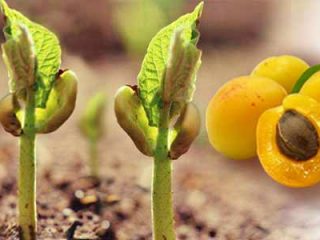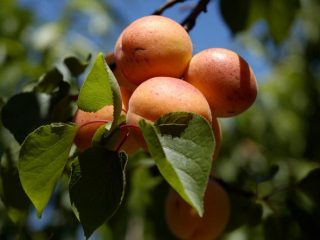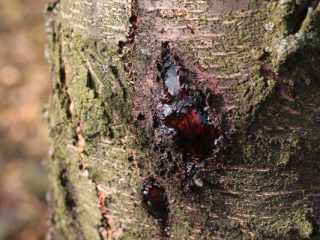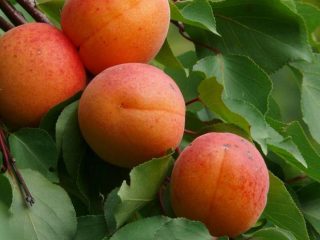Content
- 1 What year does apricot bear fruit after planting?
- 2 Will an apricot bear fruit if it is alone?
- 3 How many apricots must be planted for them to bear fruit?
- 4 How does an apricot bear fruit?
- 5 How long does it take for an apricot to bear fruit?
- 6 How often does apricot bear fruit?
- 7 Why does apricot not bear fruit?
- 8 What to do if the apricot does not bear fruit
- 9 Why does apricot bear fruit poorly?
- 10 Recommendations
- 11 Conclusion
The apricot tree is heat-loving and requires special care. Following the recommendations of experienced gardeners will help you get a good harvest from your garden plot. If an apricot does not bear fruit, then the primary source must be sought in an incorrectly selected planting site, violations of watering rules, incorrect feeding, or an attack by parasitic insects or diseases.
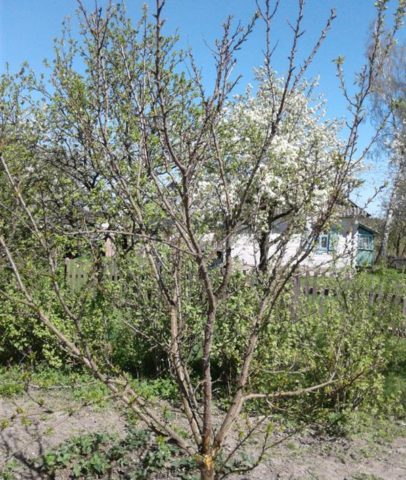
If the apricot does not bloom, the reason may be non-compliance with the rules of agricultural technology
What year does apricot bear fruit after planting?
There are several factors that determine the speed at which fruit appears on a tree.
Dates when apricots begin to bear fruit:
- Landing method. If the work was carried out with seedlings, then the first apricots should be expected no earlier than after 36 months.
- Drop off point. The plant must be protected from northern winds. Groundwater located near the root system poses a particular danger to the seedling. The tree cannot tolerate constant humidity, the roots will begin to rot and it will die.
- Formation time The first fruit depends on the apricot variety. When purchasing young animals, you need to focus on local climatic conditions, regional and quality characteristics.
For the rootstock you can use not only wildflower, but also any stone fruit plant, plum or cherry plum. When planting, it is necessary to ensure that its root part rises above the ground level (5-6 cm).
Will an apricot bear fruit if it is alone?
A plant does not always require a pair to bear fruit. There are self-fertile species that produce decent yields, for example, Northern Triumph, Tsarsky, Dessertny, Pineapple.
Experienced gardeners advise checking with the seller all the quality characteristics of the tree before purchasing seedlings.
How many apricots must be planted for them to bear fruit?
Experts recommend planting 2 to 4 trees of the same variety so that they can pollinate each other. The artificial type of pollination is recommended for Iceberg, Countess, Success, Best Michurinsky, Kichiginsky.
If the size of the plot does not allow planting a full-fledged garden, then a branch of another variety of crop is grafted onto one apricot tree.
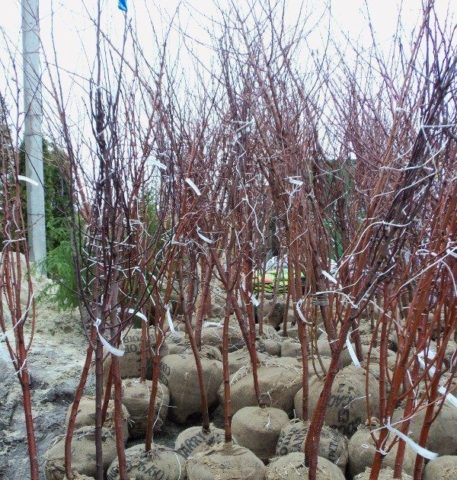
When purchasing apricot seedlings, you need to know its characteristics.
How does an apricot bear fruit?
The characteristic features of the tree include the ability to transform growth buds into fruit buds on the shoots of the 2-3rd wave of annual growth. When the water regime improves, they give another wave of growth: after the main one, which takes place in the spring and summer, at the end of the season the apricot produces additional shoots (subject to standard feeding). The resulting branches bloom later (after 7 days), produce a good harvest next year and are less susceptible to the influence of return frosts in the spring.
On what branches does apricot bear fruit?
Most of the harvest is formed on short branches, a smaller part - on strong annual shoots. The best quality fruits are obtained from overgrowing parts located near thick branches.
How long does it take for an apricot to bear fruit?
The culture has been consistently producing fruit for about 20 years in a row. The increase in harvest volumes depends on:
- from the correct choice of landing site;
- correct pruning;
- timely watering and fertilizing.
There are cases when apricots bear fruit for up to 25 years. In the absence of proper care, he may die before the specified time.
How often does apricot bear fruit?
The frequency of fruit formation depends on various factors:
- landing region;
- compliance with frost protection rules;
- proper care of the tree.
Experts believe that apricots should bear fruit annually, but in some cases there may be a rest period: every two seasons. The absence or small quantity of the harvest is associated with poor quality care or flowers killed by spring frosts.
Why does apricot not bear fruit?
If there are no fruits on the apricot, then the sources of the problem are considered to be:
- planting in heavy and clayey soil, the issue is resolved by adding sawdust, sand, manure, and regular (in spring, summer, autumn) digging of the earth in the area around the trunk circle;
- increased acidity of the soil, its indicators are artificially reduced by adding lime;
- insufficient or excessive watering.
Incorrect application of fertilizers negatively affects the harvest. In the spring you need to apply organic fertilizers, and in the summer you need to apply phosphorus-potassium fertilizers.
Why does apricot bloom but not bear fruit?
Barren flower occurs under the following factors:
- lack of pollination;
- damage to crops by diseases and pests;
- unfavorable weather conditions.
If an apricot grows on depleted soil, then the lack of nutrients also affects its yield.
Why does apricot seed not bear fruit?
The appearance of fruits depends on the age of the plant: the first shoots after planting appear the next season. The formation of apricots should not be expected earlier than 5-6 years after planting the seeds. Additional sources of the problem are considered to be lack of pollination, improper watering, and frost damage to the buds.
Why doesn't apricot bloom?
The reasons why flowers do not appear on a crop are presented:
- poor conditions for growth;
- insect attacks and diseases;
- rare or irregular feeding.
The speed at which flowers appear depends on the type of tree: some produce the first ovaries after 3-4 years, some not earlier than five years of age.

You shouldn’t expect apricots on old individuals over 40 years old; you need to plant young ones in their place
What to do if the apricot does not bear fruit
Experienced gardeners offer several methods to make apricots bloom and bear fruit.First you need to find the original source of the problem and only then choose a way to solve it.
What to do if an apricot blooms but does not bear fruit
Issues with the formation of flowers arise under the influence of several factors:
- the crop is not capable of self-pollination; trees of other varieties are planted nearby;
- Rainy weather leads to a decrease in the activity of bees and requires additional attraction of insects.
For preventive purposes, flowers are planted next to apricots. If the technique is ineffective, then spraying the trees with honey solution comes to the rescue.

Planting flowers near an apricot tree will attract bees
What to do if apricot does not bloom
Ways to solve problems with flowering depend on the source of their appearance:
- Immaturity of the tree. You need to study the characteristics of the seedlings, find out in what year the first formation of flowers occurs. Some varieties bloom for 3-4 seasons, some take 6-8 years.
- Wrong variety. When purchasing, preference is given to winter-hardy and frost-resistant subspecies. Warm-season crops are not suitable for cold climates.
- Incorrect landing. Attempts to plant a seedling in the fall often end in prolonged illness. The best time for planting is spring. The crop will not bloom in waterlogged soil; preference is given to loose and nutritious soil. An excess of water and fertilizers negatively affects the condition of apricots.
- Freezing. Lack of snow and sudden changes in weather can disrupt the formation of flowers due to freezing of the buds. For the winter, the trees need to be wrapped, late flowering should be stimulated in the spring with 3% Bordeaux mixture, and pruning should be done in summer.
Pests and diseases play an important role in the lack of flowers. Known diseases due to which the crop does not bear fruit include:
- Gum treatment – determined by the appearance of a sticky, viscous liquid that solidifies into a glassy mass. Occurs in response to improper pruning, sunburn, frostbite, and fungal infection.
Gum growths are removed with a sharp knife, disinfected with 1% copper sulfate, and lubricated with garden pitch.
- Moniliosis, manifested by falling flowers and foliage, cracks in wood. Before flowering, treatment is carried out with a 3% solution of Bordeaux mixture, after which its concentration is reduced to 1%. Additionally they use: Phthalan, Kuprozan, Horus.
Fruits, flowers, foliage and branches affected by moniliosis are burned
- Clusterosporiasis – a fungal infection affects all parts of the plant. It is determined by the appearance of orange-reddish spots that degenerate into chronic ulcers; the leaves are covered with holes.
Treatment of clasterosporiasis is similar to the fight against moniliosis
Apricots may not bear fruit due to attacks by insect pests. Leaf roller caterpillars destroy leaves and flower buds, and after the process of summer pupation and transformation into butterflies, they re-lay eggs on nearby trees. To combat parasites, they use Prophylactic, Lepidotsid, Chlorophos, Bitoxibacillin. Discovered clutches and folded leaves with insects are cut off and destroyed.
Why does apricot bear fruit poorly?
Low yields may be due to:
- With an excess of fertilizers. The culture requires 4 organic and 2 mineral fertilizers. If the plant is overfed at the seedling stage with fertilizers with an excess of nitrogenous substances, then the flowering period is significantly delayed. A large amount of nitrogen provokes active growth of shoots to the detriment of flowers. If overfeeding occurs, then the tree is left without feeding for the next season.
- Incorrect pruning.Untimely, traumatic removal of excess branches provokes gum formation. There may be minimal or no flowering.
The video explains why apricots do not bear fruit or refuse to bloom:
Recommendations
The crop will begin to produce the expected yields only if the following rules of prevention and cultivation are observed:
- choose the right plant variety suitable for local climatic conditions;
- comply with the conditions of normative tree development, watering, fertilizing, preventive pruning;
- Regularly carry out disease prevention and pest control.
The culture requires some care. If you strictly follow the rules, you can avoid many future problems and get a standard yield.
Conclusion
In order not to look for answers to why apricots do not bear fruit, you need to remember the simplest requirements: Experienced gardeners advise studying all available material on the crop before purchasing young plants and planting them. An incorrectly chosen variety, characterized by its heat-loving nature, will not take root in cold regions and may die at the first serious frost. Expert advice will help you avoid most problems with your apricot orchard, get enough fruit, and prevent the development of diseases.

